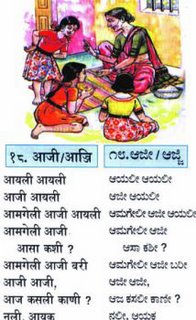
Now children can opt for Konkani as an optional subject in the Coastal Karnataka district schools.
WRITTEN KONKANI: The book with both the Devnagari and Kannada scripts.
MANGALORE
Konkani is considered a minority language, but the efforts to bring it into the mainstream have been tremendous. The language has been put on the Eighth Schedule of the Constitution (that schedule deals with the officially recognised languages of the country).
Notable effort
But the most notable of the efforts is the one which encourages children to learn to read and write Konkani through textbooks. The first ever Konkani textbook for the primary classes is ready and thanks to the Karnataka State Konkani Linguistic Minority Educational Institutions Association of Mangalore, this textbook will be in the hands of the children who wish to take up Konkani as an optional subject in the primary school level.
The Konkani Bharati as it is titled, the textbook heralds a new learning process for Konkani. Goa State has already made this book a part of the primary school education there and had permitted the Association to make the required changes in the textbook in accordance with the culture and academics of Karnataka State. The Association wasted no time in getting expert opinion on the changes and within four months, the textbook has been prepared and printed.
Two scripts
One of the best things the Association did was to interface the Devanagari script with the Kannada script, both of which are used in Karnataka State for writing Konkani. Devnagari is classically used for writing Konkani in Goa, Maharashtra and Gujarat, while in Karnataka, Kannada has been preferred by the Konkani people, as all of them also read, write and converse in Kannada fluently.
Printed in full colour with attractive graphics and caricatures, the book also follows the classical way of relating words with things, persons, relations and the surroundings of the children.
According to the secretary of the Association, Dr. Mohan Pai, the book has been received with a sense of belonging by the Konkani-speaking people and they are enthusiastic about their children learning Konkani with the help of professionally produced textbooks. Initially, this textbook will be taught in Standards I, II and III in a combined class and the Association has requested the schools (79 of them in the entire Coastal Karnataka — Dakshina Kannada, Udupi and Uttara Kannada) to send their teachers for an orientation workshop which will be held either in Udupi or in Kumta shortly. Once the teaching and learning process of the first book is on, the Association will find experts to prepare the second and third books immediately.
With Konkani entering mainstream academics, children in Dakshina Kannada now have five optional languages, namely Kannada, Konkani, Urdu, Hindi and Sanskrit — one of the longest line-up of languages in the State.

No comments:
Post a Comment